01 STRUCTURAL SYSTEM
The Gridshell is a spatially curved framework of rods. The rod elements form a planar grid with rectangular meshes and constant spacing between the knots (nodes). The form of a grid shell is determined by inverting the form of a flexible hanging net.
This classical definition has been expanded with new versions incorporating the investigation in this structural system through the years:
Doubly curved surface from a lattice of (…) laths bolted together at uniform spacing in two directions. Diagonal stiffness can be introduced (…) by making the joints rigid, (…) adding cross ties, (…) adding rigid cross bracing of equal area to the laths“ (Happold + Liddell)
„Continuous surface with lots of holes“ (Chris Williams)
02 REFERENCE PROJECTS
For this comparative analysis, we will run through six examples which include different uses as whisky distillery, exhibition spaces, spa facility or a big canopy to store wood and protect it from the rain.
| Name of the project | Location | Year | authors |
| Macallan Distillery | Aberlour(Scotland) | 2018 | Rogers Stirk Harbour + Partners |
| Toskana thermal baths | Bad Orb ( Germany) | 2010 | Ollertz Architekten, Fulda / Trabert + Partner, Geisa |
| Elephant house | Zurich ( Switzerland) | 2014 | Markus Schietsch Architekten / Walt + Galmarini AG |
| Multihalle | Manheim ( Germany) | 1975 | C. Mutschler und Partner, Mannheim; F. Otto und Partner, Warm- born, D / Ove Arup |
| Weald and Downland Museum | Chichester(UK) | 2017 | Edward Cullinan Architects, London / Buro Hapold |
| Triaxial GridShell of Eucalyptus | Lugo ( Spain) | 2018 | various |
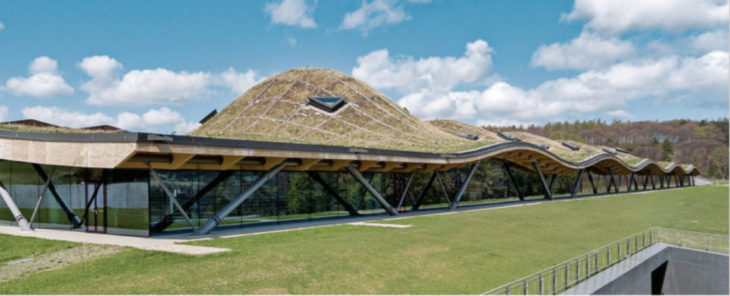
Macallan Distillery
Photo: Joao Souza
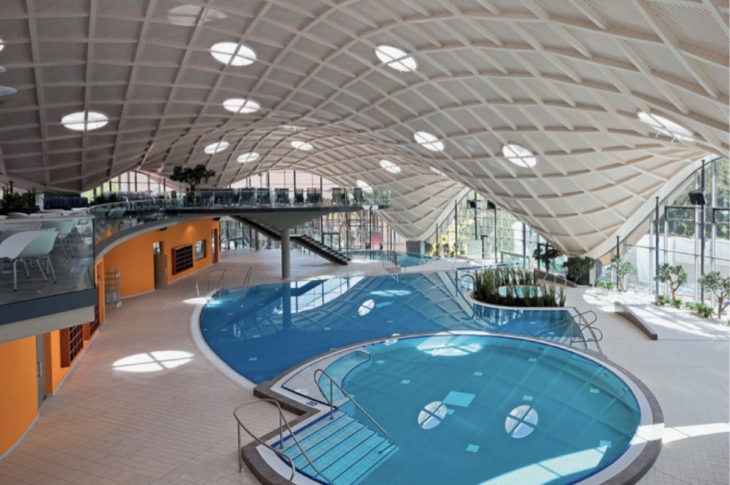
Toskana Thermal Baths
Photo:Detail
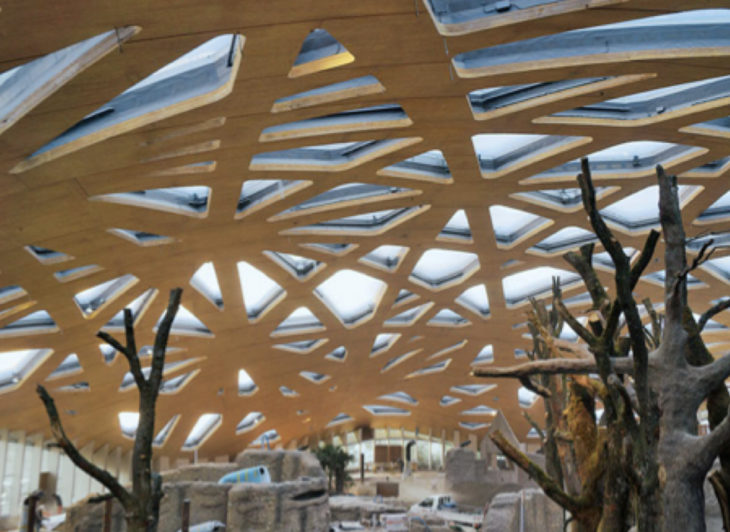
Elephant house
Photo Detail
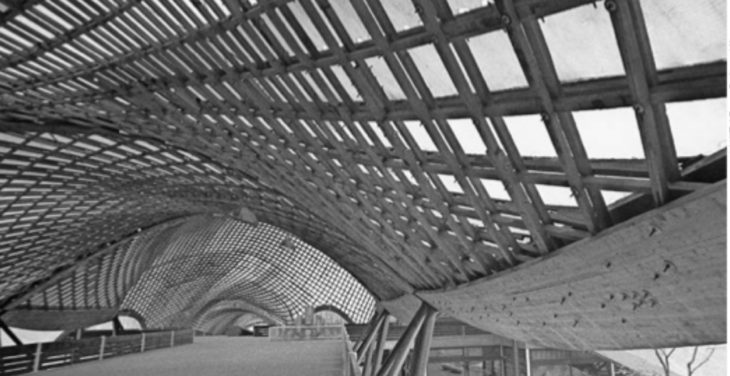
Multihalle Manheim
Photo Detail
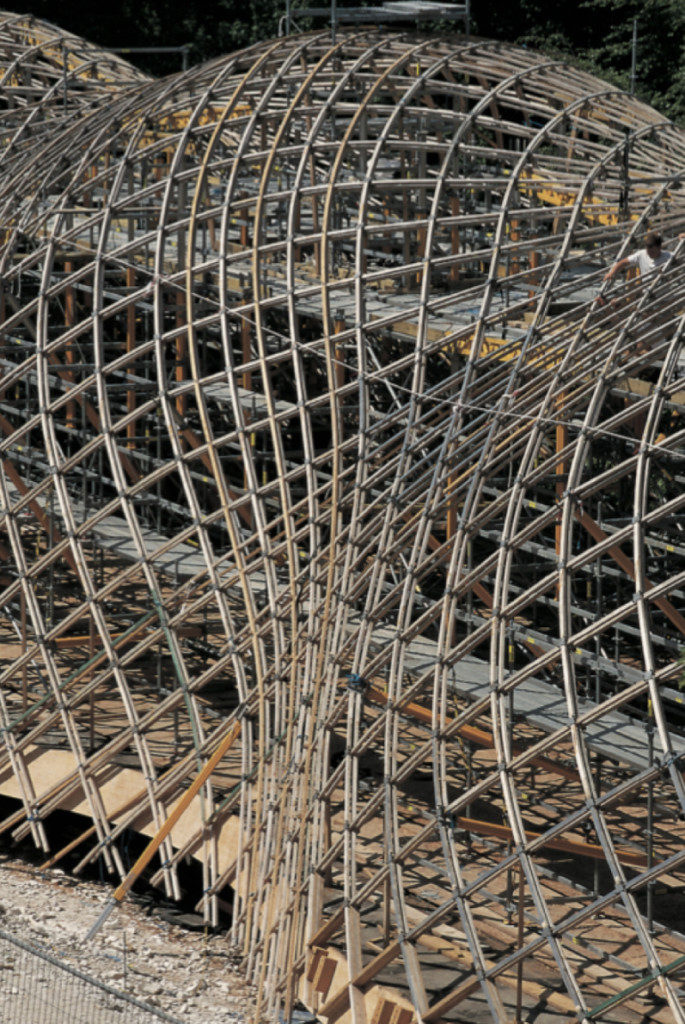
Weald and Downland museum
Photo Heidi Wessely
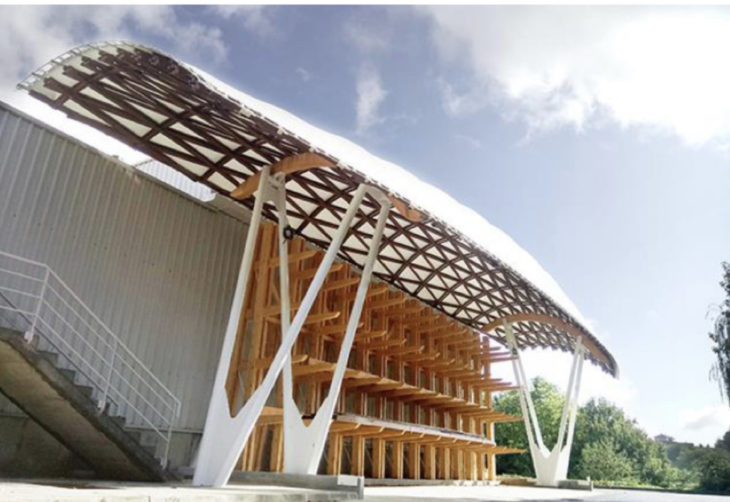
Triaxial Gridshell of Eucalyptus
03 SPANS
The Gridshells included in this analysis cover different ranges of span:
From the Downland Museum and the Eucalyptus Triaxial gridshell with 15 meters span to the Elephant House with 80 meters span, passing through the 36 meters of the Macallan Distillery and the 60 and 63 meters of the Multihalle in Manheim and the Toskana thermal baths respectively.
04 SUPPORTING CONDITIONS
In general all buildings show similar system where the gridshell is supported by a perimetral and rigid ring absorbing all the different forces.
The ring defines the edge of the shell and is finally supported punctually by pillars or connected directly to foundations.
Only the Macallan Distillery and the Triaxial Gridshell in Lugo show a different system. The shell lays on to beams, from steel in the Distillery and Glulam in the Lugo building, and the location of these supports do not correspond with the edge of the shell.
05 MATERIALS
We can find both sawn or composite timber solutions in the different projects we are analyzing:
Combination of CLT core and LVL cheeks in the beams forming the Macallan Distillery shell.
The Elephant House also uses CLT boards but in a different configuration where these boards are part of the multilayer composition.
Spruce Glulam battens are used in the Toskana thermal baths.
The rest of the projects use sawn timber in multilayer systems of battens: Hemlock in the Multihalle, Oak in the Weald and Downland Museum and finally Eucalyptus in the Triaxial gridshell in Lugo.
06 CROSS SECTIONS AND SLENDERNESS
Gridshell concept is based in the combination of many reduced cross section elements, disposed in different layers.
With the excepction of the Macallan Distillery, which is based on a grid of 750×200 beams, we can find this multilayer system in the rest of the analysed projects:
- 4 layers of 50×50 battens in the Multihalle, the combination of these layers provides final 200 mm deep system.
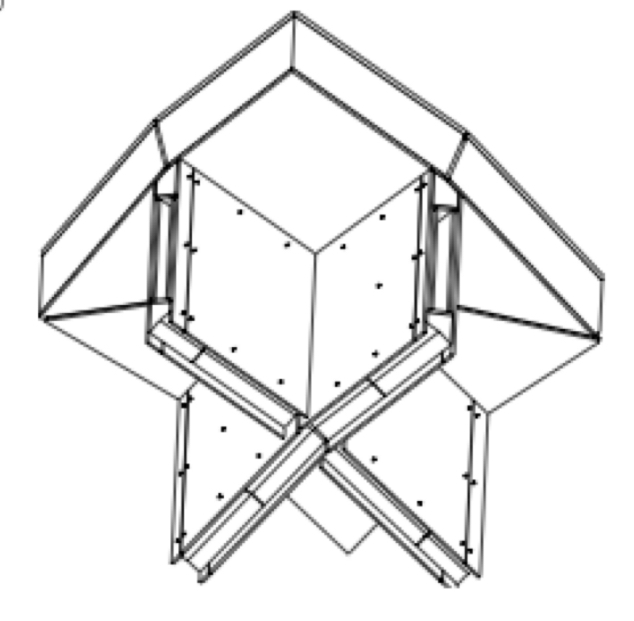
Diagram of the beams grid of the Macallan Distillery
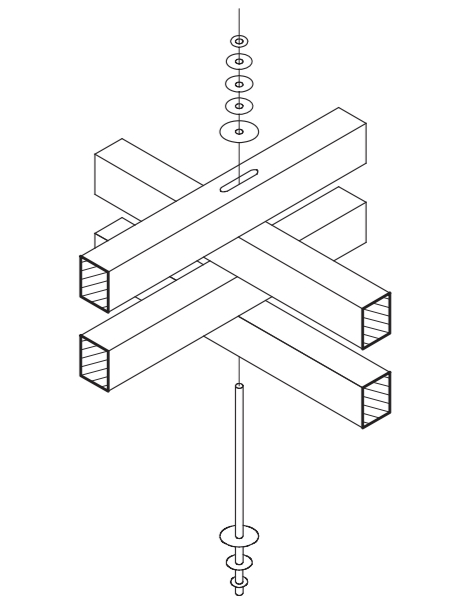
Diagram showing the 4 layers of 50×50 mm battens in the Multihalle in Manheim
- 4 layers of 50×35 mm battens in the Weald and Downland Museum , getting 140 mm deep system.
- 6 layers of 75×30 mm battens in the Triaxial gridshell in Lugo, giving a total of 180 mm depth.
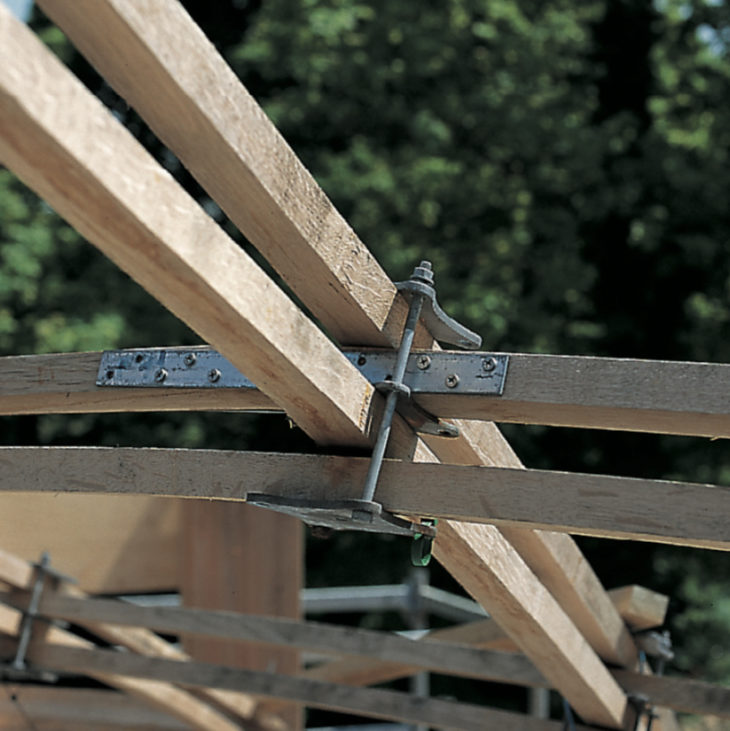
Photo of the four layers of oak battens in the Downland Museum
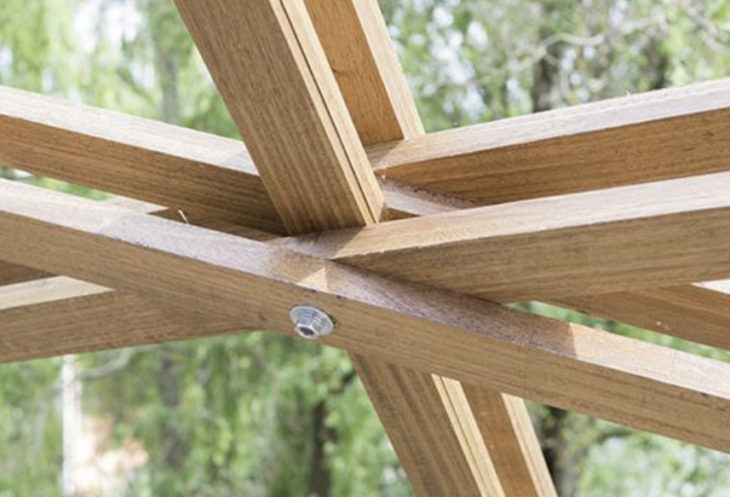
Photo of the six layers of eucalyptus battens in the Triaxial gridshell in Lugo
- 3 layers of 80 mm CLT boards are used in the Elephant House, getting a total of 240 mm height.
- 240 mm is also the depth of the Toskana thermal baths gridshell, made by the combination of spruce ribs and softwood boards.
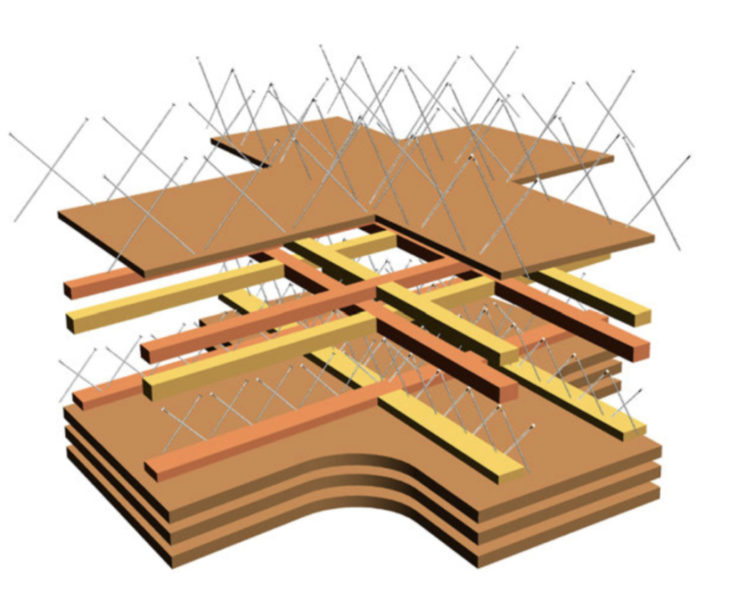
Diagram of the CLT boards layers forming the Elephant House gridshell
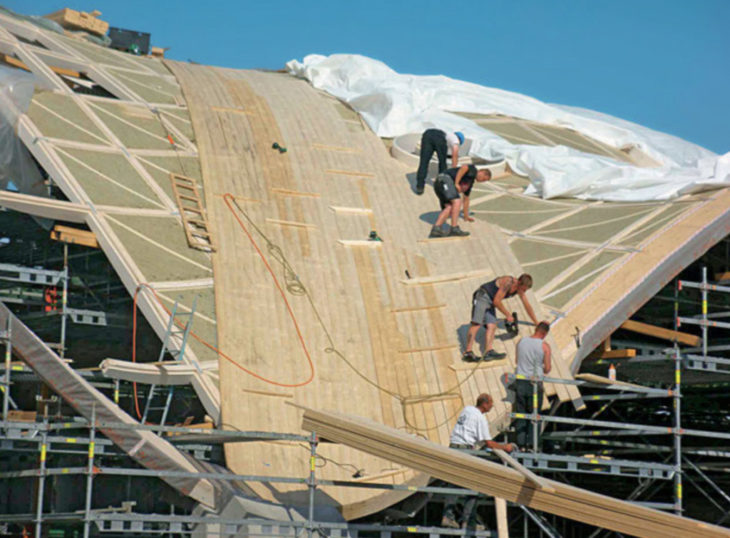
Photo of the Toskana thermal baths construction showing the multilayer configuration
We can observe then how a 150-240 mm depth element has been used in almost all the projects to save spans from 15 to 80 m.
This gives a variety of slenderness ratios:
L/333 in the Elephant House, L/300 in the Multihalle in Manheim and L/263 in the Toskana Thermal Baths,
L/107 in the Downland Museum and L/95 the Triaxial gridshell.
Finally the Macallan Distillery achieves the less slenderness ratio of L/48.
07 BRACING
We can distinguish four different ways providing shear stiffness to the gridshell plane in the analyzed projects:
- Attaching shear resistant boards as part of the multilayer composition of the gridshell.
We can find this system in the Macallan Distillery where CLT boards in triangular shapes are installed above the beams grid.
The Toskana thermal baths use 30×100 mm softwood boards attached on top of the glulam grid.
- Including diagonal elements to the main grid.
The Manheim Multihalle uses metal cables as diagonals of the square grid. Same diagonal system is used in the Downland Museum but made of timber in this case.
We can see also glulam diagonal members in the photo of the construction of the Toskana thermal baths.
- Including a shear resistant element as part of the gridshell configuration.
The elephant house is made of the combination of shear resistant CLT boards, so does not require an additional element to provide bracing.
- Triaxial arrangement of the different layers.
The Triaxial Gridshell in Lugo is made of 3 double layers of timber battens, one of this double layers is specialized providing the shear resistance.
3x(75×10) mm timber members as we can see in the diagram below.
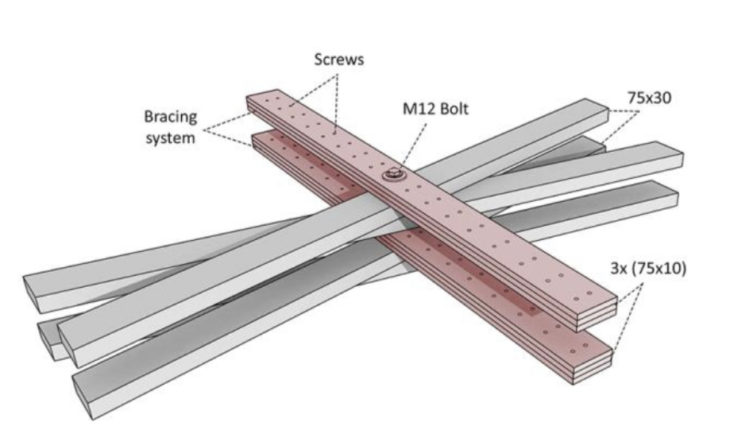
Diagram of the bracing layer ( in red) in the Triaxial gridshell in Lugo.
This way the different layers are arranged generating triangles on the surface of the gridshell.
08 SUMMARY DIAGRAMS
In the diagram below we can find a comparative graphical analysis of the 6 projects.
The graphic diagrams are very useful to see how most of the projects are using in full the capacity of the gridshell to solve all the structure with one system. The exception would be the Macallan Distillery and the Triaxial gridshell where the gridshell lays onto a conventional portal frame configuration.
We can see also clearly three projects achieving larger spans ( from 60-80) and also heights ( from 15-20 meters). These are the Elephant House, Toskana thermal baths and Manheim Multihalle.
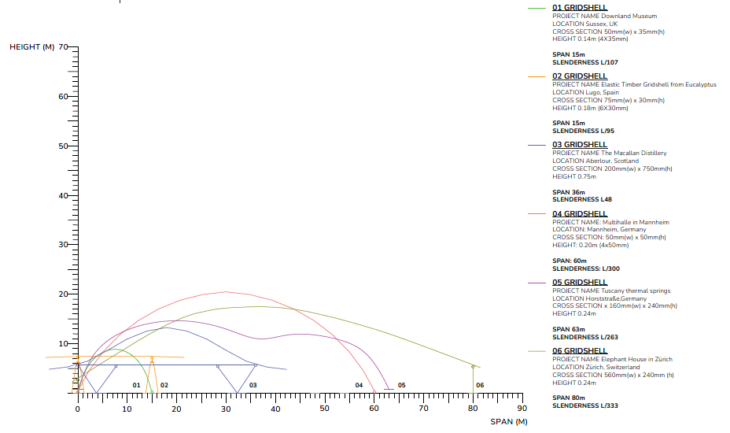
Analysing 6 examples of Timber Gridshell structures is a project of IAAC, Institute for Advanced Architecture of Catalonia developed at the Master in Mass Timber Design in 2021/2022 by students:
Maria Cotela, Alexandros Kitriniaris, Ricardo Pariente.
Faculty: Felipe Riola-Parada